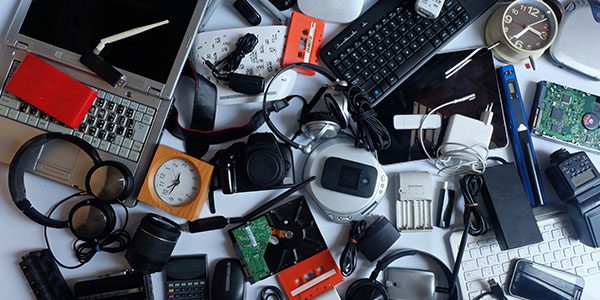Master the Demands of R2 Accreditation to Guarantee Sustainable Company Practices
At the forefront of this motion is the R2 qualification, an extensive criterion that sets the bar high for electronics recyclers and refurbishers. As organizations strive to align with eco aware practices, grasping the requirements of R2 accreditation is paramount. In a world where sustainability is no longer a plain buzzword however an organization necessary, delving into the details of R2 qualification is a calculated step that can pave the way for lasting success and positive ecological effect.
Significance of R2 Qualification
Achieving R2 Accreditation is essential for organizations aiming to show their dedication to responsible and sustainable electronic waste monitoring techniques. This qualification, created by SERI (Lasting Electronics Recycling International), sets the standard for responsible reusing practices in the electronics industry. By obtaining R2 Qualification, companies signal to their stakeholders that they follow strict ecological, health, and security policies while handling digital waste.
Among the essential reasons R2 Qualification is essential is its focus on sustainability. With electronic waste being a considerable international issue, organizations need to display their commitment to reducing the ecological impact of their procedures. R2 Accreditation needs firms to implement processes that make sure the correct handling, refurbishment, and recycling of digital waste, consequently contributing to the round economy and decreasing the accumulation of e-waste in landfills.
Furthermore, R2 Qualification boosts a company's credibility and reliability. In today's eco mindful market, customers and companions are significantly looking to team up with organizations that prioritize sustainability. By attaining R2 Qualification, business can identify themselves as leaders in accountable e-waste management, obtaining a competitive side and attracting similar stakeholders.
Trick Components of R2 Criteria

Actions to Obtain R2 Certification
To get R2 Certification, companies should thoroughly demonstrate conformity with a set of rigid requirements and guidelines. The procedure of acquiring R2 Certification involves a number of vital steps. The initial action is to familiarize oneself with the R2 Requirement and its demands. This consists of understanding the concepts of responsible recycling, data protection, environmental defense, and worker health and security that create the click now structure of the certification.
Following, companies need to examine their present practices and processes to determine any voids that need to be dealt with to satisfy the R2 Requirement. This might involve implementing new treatments, purchasing training programs, or Learn More making changes to existing operations. As soon as any shortages are remedied, companies can proceed to develop a comprehensive monitoring system that straightens with the R2 requirements.
Complying with the implementation of the needed modifications, services should go through a third-party audit to confirm their conformity with the R2 Standard (r2 certification). This audit is conducted by an accredited certification body and includes a thorough evaluation of the organization's facilities, procedures, and documents. Upon successful conclusion of the audit, companies can get their R2 Certification, demonstrating their commitment to lasting and responsible business techniques
Benefits of R2 Compliance
Organizations that stick to R2 compliance criteria can open a myriad of benefits in today's sustainable business landscape. Additionally, R2 compliance promotes environmental sustainability by ensuring that digital waste is taken care of in an ecologically pleasant way, decreasing the effect on land fills and all-natural resources. On the whole, accomplishing R2 compliance not only aids organizations satisfy governing demands however likewise promotes a society of environmental responsibility and functional excellence.
Preserving R2 Certification
Showing an ongoing dedication to responsible digital waste management practices, organizations need to concentrate on the careful procedure of keeping R2 accreditation. Preserving R2 qualification involves regular audits, internal evaluations, and constant renovation efforts to make sure compliance with the strict requirements stated by the Liable Recycling Practices (R2) standard. Organizations has to remain vigilant Check This Out in checking their electronic waste management processes, information safety steps, and overall ecological performance to promote their R2 qualification condition.
Normal training and education for staff members are vital to maintain R2 certification, as employee require to be well-informed about the current ideal practices and industry standards. Keeping comprehensive records and paperwork of electronic waste recycling activities, downstream suppliers, and interior procedures is vital for showing compliance during audits.
Furthermore, companies ought to actively involve with their supply chain partners and suppliers to guarantee that all entities associated with the digital waste administration process follow R2 requirements. By fostering a society of transparency, accountability, and continual enhancement, companies can efficiently preserve their R2 accreditation and promote their dedication to sustainable organization techniques.
Verdict

Attaining R2 Qualification is essential for businesses aiming to demonstrate their dedication to sustainable and responsible digital waste management methods. By acquiring R2 Accreditation, businesses signal to their stakeholders that they adhere to rigorous environmental, wellness, and safety laws while managing digital waste.
Upon effective completion of the audit, companies can receive their R2 Qualification, demonstrating their commitment to lasting and responsible service methods.
Maintaining R2 qualification involves normal audits, internal evaluations, and continuous renovation initiatives to make certain compliance with the strict requirements established forth by the Accountable Recycling Practices (R2) requirement. By understanding the vital elements of R2 standards, taking the essential steps to get qualification, and gaining the benefits of R2 conformity, services can show their dedication to accountable electronic waste management.